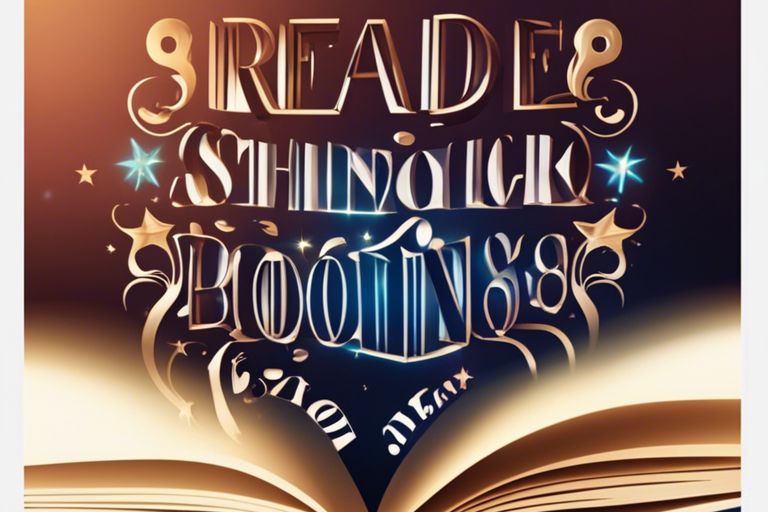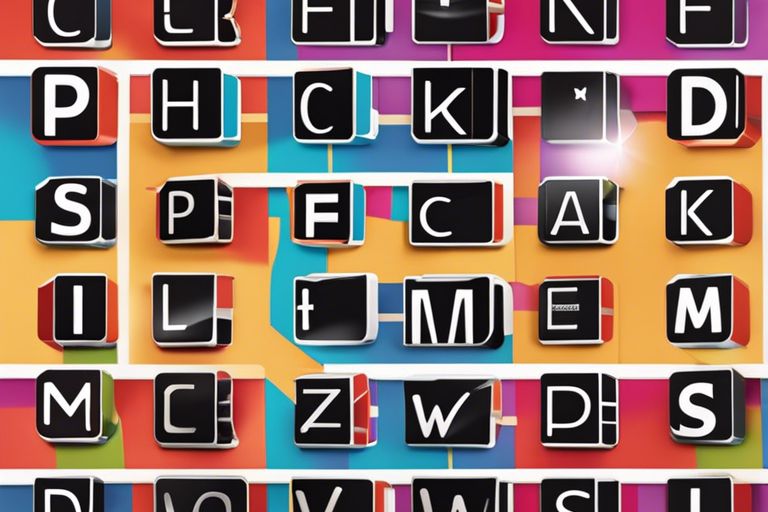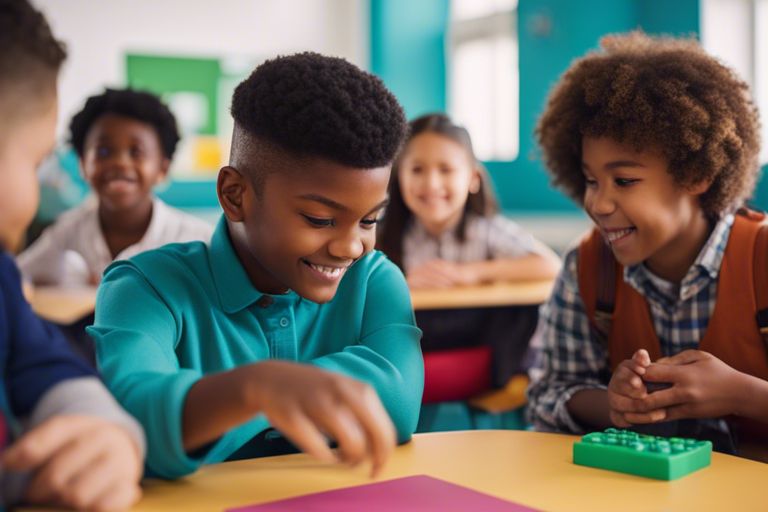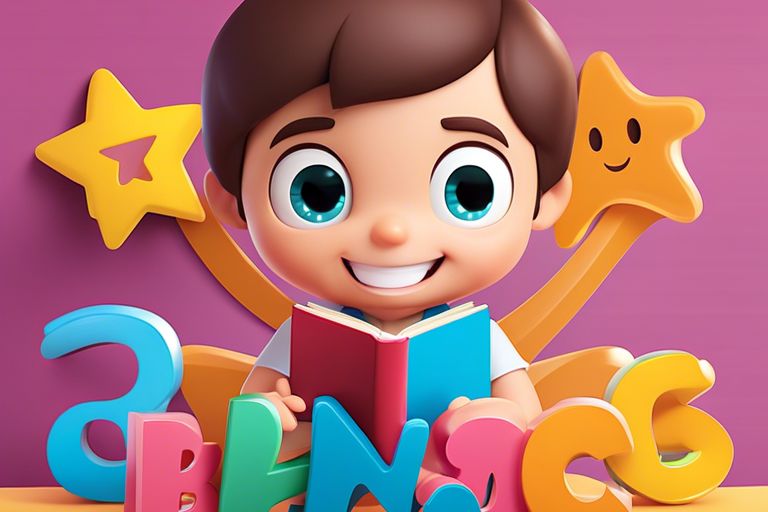Phonics Hopscotch
Phonics Hopscotch is a fun and interactive game that combines the classic playground game with phonics learning. This game is perfect for energetic learners who thrive on movement and hands-on activities.
Jump to letters
In the ‘Jump to letters’ version of Phonics Hopscotch, each square is labelled with a different letter of the alphabet. When the player hops onto a square, they must say the sound that the letter makes. This helps reinforce letter-sound recognition and improves phonemic awareness. It’s a great way to engage children in learning phonics while they stay active.
Blend sounds
In the ‘Blend sounds’ variation, the squares are marked with two letters that make a blend sound when spoken together, such as ‘sh’ or ‘ch’. As the player jumps onto a square, they must say the blend sound out loud. This activity helps children practise blending sounds together to form words, enhancing their reading and decoding skills.
The ‘Blend sounds’ version of Phonics Hopscotch is particularly beneficial for learners who are developing their reading fluency and need extra practice with blending sounds. It provides a dynamic way to reinforce phonics concepts through physical activity.
Key Takeaways:
- Variety is key: Offering a range of phonics games keeps energetic learners engaged and excited.
- Encourage movement: Incorporating physical activity into phonics games can help restless learners focus better.
- Use technology: Utilising educational apps and online games can make phonics practice more interactive and enjoyable.
- Team up: Group activities and team-based games can promote collaboration and social interaction among learners.
- Make it fun: Creating a lively and enjoyable atmosphere during phonics games can enhance learning and retention of new skills.
Phonics Twister
Phonics Twister is a fun and interactive game that combines the classic game of Twister with phonics learning. It is a fantastic way to engage energetic learners and make phonics practice enjoyable.
Twist on sounds
In the ‘Twist on sounds’ variation of Phonics Twister, students are required to spin the spinner and place their hand or foot on a specific colour on the mat. Once they have landed on a colour, they must say a word that starts or ends with the sound associated with that colour. This not only helps strengthen their phonics skills but also improves their flexibility and coordination.
In ‘Twist on sounds’, students may find challenging sounds such as ‘th’, ‘sh’, or ‘ch’. This encourages them to think creatively and practice these sounds in a fun and engaging way.
Word formations
The ‘Word formations’ version of Phonics Twister focuses on building words using the alphabet mat. Students have to spell out words dictated by the teacher, their peers, or from flashcards. This activity enhances their spelling and phonics recognition skills while keeping them physically active.
Word formations can be played in teams, where students work together to create words, promoting collaboration and communication skills. This fosters a sense of team spirit and friendly competition among learners.
Sound Fishing Game
Introducing the Sound Fishing Game, a fun and interactive way to enhance phonics skills in energetic learners. This engaging phonics game involves catching syllables and assembling words, making learning enjoyable and effective.
Catch syllables
In the Catch Syllables game, students will listen to a word being pronounced and then fish out the individual syllables that make up the word. This activity helps students develop their auditory discrimination skills as they identify and differentiate between syllables.
By actively engaging in this game, students can improve their phonemic awareness and decoding abilities. The excitement of ‘catching’ the correct syllables keeps learners enthusiastic and motivated to participate in the learning process.
Assemble words
The Assemble Words game challenges students to put together the syllables they have caught to form complete words. This activity reinforces the connection between sounds and letters, helping students strengthen their blending skills and build their vocabulary.
As students successfully assemble words, they gain confidence in their ability to decode and read unfamiliar words. This hands-on approach to word formation encourages active learning and reinforces the link between spoken and written language.
For additional practice in word building, teachers can adjust the difficulty level by introducing longer or more complex words. This allows students to progress at their own pace and ensures a tailored learning experience.
Phonics Treasure Hunt
Embark on an exciting phonics adventure with the interactive Phonics Treasure Hunt game! This innovative game combines learning and fun, making it perfect for energetic young learners eager to master phonics skills.
Seek letter clues
Encourage children to search for hidden letter clues around the classroom or outdoor space. Each letter clue will lead them closer to uncovering the ultimate treasure, while reinforcing their phonics knowledge. Make sure to provide hints or riddles related to the letter sound to keep them engaged and challenged.
As children collect each letter clue, they can say the corresponding letter sound out loud. This interactive activity promotes active listening and phonemic awareness as they piece together the puzzle to unlock the hidden treasure.
Spell treasure words
Once all the letter clues are found, children can use them to spell out treasure words related to the phonics focus. Encourage them to arrange the letters in the correct order to reveal the secret words, reinforcing their understanding of phonics rules and blending sounds together.
Reinforce spelling skills by asking children to write down the treasure words they have uncovered. Celebrate their success as they decode and spell out each word, boosting their confidence and motivation to continue learning phonics.
Letter Sound Bingo
Letter Sound Bingo is a delightful phonics game that engages energetic learners in a fun and interactive way. This game enhances children’s understanding of letter sounds and helps reinforce their phonics skills in an enjoyable setting.
Match sounds
In the ‘Match sounds’ activity, children listen to a sound being played and identify the corresponding letter on their bingo card. This helps them strengthen their auditory discrimination skills and associate sounds with the correct letters. Encourage active participation and celebrate correct matches to keep the energy levels high throughout the game.
Fill cards
The ‘Fill cards’ game variation involves children filling in blank spaces on their bingo cards with the correct letters that correspond to the sounds being played. This activity reinforces their letter-sound recognition and helps them become more proficient in distinguishing between different sounds. Creating a sense of challenge and competition can motivate learners to pay close attention to the sounds being called out and actively engage in the game.
For the ‘Fill cards’ activity, you can provide prizes for the first player to fill in a line or a full house, to add an element of excitement to the game. This can encourage healthy competition among the children and make the learning experience more enjoyable and rewarding.
Phonics Balloon Pop
Phonics Balloon Pop is a fun and engaging game that can help energetic learners improve their phonics skills while having a blast. This game combines the excitement of popping balloons with the educational value of practising phonics, making it an excellent choice for both classroom settings and home learning environments.
Burst letter balloons
In the ‘Burst letter balloons’ variation of Phonics Balloon Pop, children are presented with balloons that have individual letters printed on them. The objective is to pop the balloons in the correct order to spell out a given word. This activity not only challenges children to recognise and sequence letters, but also reinforces their understanding of how letters come together to form words.
By encouraging children to identify and match letters to form words, the ‘Burst letter balloons’ game helps improve their phonemic awareness and literacy skills. This hands-on approach to learning phonics can enhance visual memory and strengthen letter-sound relationships, providing a fun and effective way for energetic learners to master phonics concepts.
Form words
In the ‘Form words’ version of Phonics Balloon Pop, children are tasked with popping balloons that contain individual letters. Once the letters are popped, the challenge is to rearrange them to form as many words as possible within a set time limit. This activity not only tests children’s knowledge of letter sounds and blends, but also encourages them to experiment with different word combinations.
The ‘Form words’ game promotes critical thinking and problem-solving skills as children work to decipher and manipulate letters to create meaningful words. This interactive and engaging activity can boost vocabulary and spelling proficiency, providing an exciting way for energetic learners to expand their phonics knowledge.
Phonics Obstacle Course
Phonics Obstacle Course is a fun and interactive way to engage energetic learners in the process of learning phonics. This game combines physical activity with phonics challenges to create a dynamic learning experience that is both educational and entertaining.
Navigate sound challenges
In this subsection, learners will navigate through various sound challenges designed to test their understanding of different phonetic sounds. From identifying initial sounds to blending sounds together, this section encourages students to listen carefully and apply their phonics knowledge practically as they move through the obstacle course.
Complete word puzzles
Complete word puzzles is another exciting part of the Phonics Obstacle Course, where learners are presented with word-based puzzles that require them to apply their phonics skills in order to solve them. By matching letters and sounds to form complete words, students will strengthen their phonetic awareness and spelling abilities in a fun and engaging way.
Word puzzles play a crucial role in reinforcing phonics concepts and improving literacy skills. By completing word puzzles, learners not only practice blending sounds and recognising letter patterns, but also enhance their vocabulary and comprehension abilities as they engage with words in a meaningful context.
Sound Matching Memory
Phonics games are a fantastic way to engage young learners in the process of mastering letter sounds and phonemes. Sound Matching Memory is a fun and interactive game that helps children strengthen their phonics skills while keeping them entertained.
Flip for phonemes
In this version of Sound Matching Memory, children are required to match pairs of cards that represent the same phoneme. By flipping cards and finding their matching pairs, children not only improve their memory skills but also reinforce their understanding of how different letters can produce the same sound. This activity is not only engaging but also educational.
Memorize matches
In the ‘Memorize matches’ subsection of Sound Matching Memory, children are challenged to memorise the location of cards with matching phonemes. This game not only encourages children to pay attention to detail but also helps them internalise phonetic patterns. By repeating this activity, children can strengthen their ability to recognise and differentiate between similar phonetic sounds.
Children can benefit greatly from the ‘Memorize matches’ game as it helps them develop stronger auditory discrimination skills. By listening carefully to the phonetic sounds and matching them correctly, children can enhance their phonemic awareness, which is crucial for their phonics proficiency.
Alphabet Cooking Challenge
Are you ready to combine the world of letters and culinary delights? The Alphabet Cooking Challenge is a fun and engaging way to reinforce phonics skills while igniting a love for cooking in energetic learners.
‘Cook’ letter recipes
Get ready to ‘cook’ up some letter recipes in this exciting phonics game! Assign each letter of the alphabet a corresponding ingredient and challenge your little chefs to create words by mixing and matching ingredients. Whether it’s ‘a’ for apple slices or ‘c’ for carrot sticks, this game will have children excited to experiment with letters in a hands-on way.
Encourage creativity by allowing children to come up with their own letter recipes using a variety of ingredients. Watch as their phonics skills improve while they explore the world of cooking with enthusiasm and curiosity.
Eat phonics delights
After the cooking comes the best part – eating phonics delights! Let children indulge in the dishes they have created while reinforcing their understanding of letters and sounds. Make learning delicious and fun with this interactive game that combines phonics with tasty treats.
Children will not only enjoy the sensory experience of tasting their creations but also solidify their phonics knowledge through hands-on practice. Get ready for a feast of phonics delights that will leave both their tummies and minds satisfied!
Phonics Puppet Show
Phonics Puppet Show is an engaging and interactive way to help young learners master phonics skills while having fun. This innovative game combines the excitement of puppetry with the educational value of phonics, making it a hit with energetic learners.
Perform sound stories
In this Phonics Puppet Show game, teachers or students can create sound stories where each puppet character represents a different phoneme or sound. As the story progresses, the characters encounter various challenges that require the audience to identify the sounds they make. This hands-on approach not only reinforces phonics concepts but also enhances listening and comprehension skills in a dynamic way.
Another way to perform sound stories is to have the audience participate in creating the sounds for the puppet characters. This interactive element not only keeps the learners engaged but also allows them to actively apply their phonics knowledge in a fun and creative manner.
Engage audience participation
Engaging the audience in the Phonics Puppet Show is crucial for creating an immersive learning experience. Encouraging children to join in by making sounds, repeating words, or even acting out parts of the story can foster a sense of involvement and make phonics learning more memorable and exciting.
By involving the audience in the performance, teachers can promote active participation and ensure that every child has the opportunity to practice and demonstrate their phonics skills in a supportive and entertaining setting.
FAQ
Q: What are phonics games and why are they important for learners?
A: Phonics games are interactive activities that help learners practice and reinforce their understanding of phonics principles, such as letter sounds and blends. They are important because they make learning phonics fun, engaging, and effective for energetic learners.
Q: How do phonics games benefit energetic learners?
A: Phonics games benefit energetic learners by providing hands-on and interactive ways to learn phonics, which keeps them engaged and motivated. These games help develop crucial reading and spelling skills in a fun and energetic manner.
Q: What are some examples of innovative phonics games for energetic learners?
A: Some examples of innovative phonics games include phonics bingo, phonics scavenger hunt, phonics twister, phonics obstacle course, and phonics word building race. These games incorporate movement, competition, and creativity to enhance the learning experience.
Q: How can teachers incorporate phonics games into their lessons?
A: Teachers can incorporate phonics games into their lessons by setting aside dedicated time for playing games, integrating games into existing lesson plans, and providing resources and support for learners to engage with the games effectively.
Q: What are the benefits of using phonics games for teaching phonics?
A: The benefits of using phonics games for teaching phonics include increased engagement and participation, improved retention of phonics rules and patterns, enhanced problem-solving skills, and the development of a positive attitude towards learning phonics. Phonics games make learning enjoyable and effective for energetic learners.












